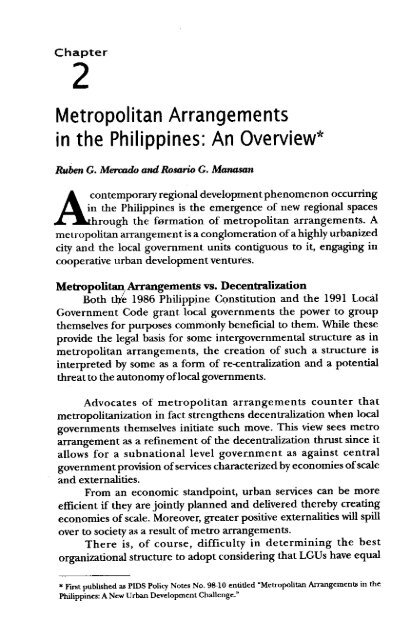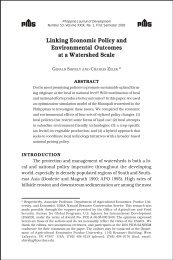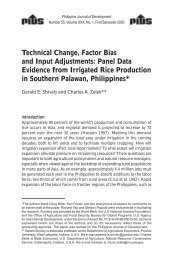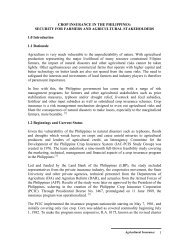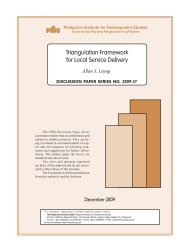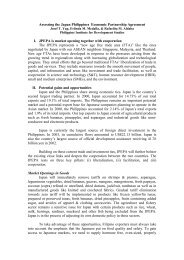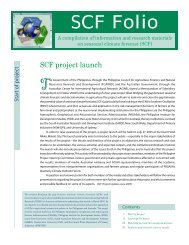- Page 2 and 3:
ManagingUrbanization Undera Decentr
- Page 4 and 5:
Copyright 2002 • by Demographic R
- Page 6 and 7:
Conclusion ........................
- Page 8 and 9:
Metropolitan Concerns in the CDO Ar
- Page 10 and 11:
Impact of the Project .............
- Page 12 and 13:
ListofFigures PART I Chapter 1 Figu
- Page 14 and 15:
Chapter 2 Table 1 Urbanization in S
- Page 16 and 17:
Table 2 Area-Specific Roles in Metr
- Page 18 and 19:
Foreword ing of the Local Governmen
- Page 20 and 21:
Part I. Analyses
- Page 22 and 23:
4 Managing UrbanizationUnder a Dece
- Page 24 and 25:
6 ManagingUrbanizationUnder a Decen
- Page 26 and 27:
8 ManagingUrbanization Under a Dece
- Page 30 and 31:
12 ManagingUrbanizationUnder a Dece
- Page 32 and 33:
14 Managing Urbanization Under a De
- Page 34 and 35:
16 ManagingUrbanizationUnder a Dece
- Page 36 and 37:
18 Managing Urbanization Under a De
- Page 38 and 39:
20 ManagingUrbanizationUndera Decen
- Page 40 and 41:
22 ManagingUrbanizationUnder a Dece
- Page 42 and 43:
24 Managing UrbanizationUndera Dece
- Page 44 and 45:
26 ManagingUrbanizationUndera Decen
- Page 46 and 47:
28 ManagingUrbanizationUnder a Dece
- Page 48 and 49:
30 ManagingUrbanizationUnder a Dece
- Page 50 and 51:
Chapter 2 Metropolitan Arrangements
- Page 52 and 53:
MetropolitanArrangementsinthe Phili
- Page 54 and 55:
MetropolitanArrangementsinthe Phili
- Page 56 and 57:
MetropolitanArrangementsinthe Phili
- Page 58 and 59:
MetropolitanArrangementsin the Phil
- Page 60 and 61:
MetropolitanArrangementsinthe Phili
- Page 62 and 63:
Metropolitan Arrangements in the Ph
- Page 64 and 65:
MetropolitanArrangements in the Phi
- Page 67 and 68:
50 ManagingUrbanizationUndera Decen
- Page 70 and 71:
Metropolitan Arrangements in the Ph
- Page 72 and 73:
Metropolitan Arrangements in the Ph
- Page 74 and 75:
Metropolitan Arrangements in the Ph
- Page 76 and 77:
MetropolitanArrangements inthe Phil
- Page 78 and 79:
MetropolitanArrangementsinthe Phili
- Page 80 and 81:
Metropolitan Arrangements inthe Phi
- Page 82 and 83:
Metropolitan Arrangements in the Ph
- Page 84 and 85:
Metropolitan Arrangements in the Ph
- Page 86 and 87:
MetropolitanArrangements in the Phi
- Page 88 and 89:
MetropolitanArrangementsin the Phil
- Page 90 and 91:
MetropolitanArrangementsin the Phil
- Page 92 and 93:
76 ManagingUrbanizationUndera Decen
- Page 94 and 95:
78 ManagingUrbanizationUndera Decen
- Page 96 and 97:
80 ManagingUrbanizationUndera Decen
- Page 98 and 99:
82 Managing Urbanization Under a De
- Page 100 and 101:
84 ManagingUrbanizationUndera Decen
- Page 102 and 103:
86 ManagingUrbanizationUndera Decen
- Page 104 and 105:
88 ManagingUrbanizationUndera Decen
- Page 106 and 107:
90 ManagingUrbanizationUndera Decen
- Page 108 and 109:
92 ManagingUrbanizationUndera Decen
- Page 110:
94 ManagingUrbanizationUndera Decen
- Page 115 and 116:
Environment and Natural Resources M
- Page 117 and 118:
Environmentand Natural Resources Ma
- Page 119 and 120:
Environment and Natural Resources M
- Page 121 and 122:
Chapter 4 Health Management: Strate
- Page 123 and 124:
Health Management: Strategies from
- Page 125 and 126: Health Management: Strategies from
- Page 127 and 128: Health Management: Strategies from
- Page 129 and 130: Health Management: Strategies from
- Page 131 and 132: Health Management: Strategies from
- Page 133 and 134: Health Management: Strategies from
- Page 135 and 136: Health Management: Strategies from
- Page 137 and 138: Health Management: Strategies from
- Page 139 and 140: Health Management: Strategies from
- Page 141 and 142: Health Management:Strategies from S
- Page 143 and 144: Chapter 5 LocalEfforts in Housing P
- Page 145 and 146: Local Efforts inHousing Provision 1
- Page 147 and 148: Local Efforts in Housing Provision
- Page 149 and 150: Local Efforts in Housing Provision
- Page 151 and 152: Local Efforts in Housing Provision
- Page 153 and 154: Local Effortsin Housing Provision 1
- Page 155 and 156: Table 2. Income of Local Government
- Page 158 and 159: 142 ManagingUrbanizationUndera Dece
- Page 160 and 161: 144 ManagingUrbanizationUndera Dece
- Page 162 and 163: 146 ManagingUrbanizationUndera Dece
- Page 164 and 165: 148 ManagingUrbanizationUndera Dece
- Page 166 and 167: 150 Managing Urbanization Under a D
- Page 168 and 169: Part II. Case Studies
- Page 170 and 171: 156 ManagingUrbanizationUnderaDecen
- Page 172 and 173: 158 ManagingUrbanizationUndera Dece
- Page 174 and 175: 160 ManagingUrbanizationUndera Dece
- Page 178 and 179: MetropolitanArrangementinthe Philip
- Page 180 and 181: MetropolitanArrangementin the Phili
- Page 182 and 183: MetropolitanArrangementin the Phili
- Page 184 and 185: Case Studies of Metropolitan Arrang
- Page 186 and 187: 174 ManagingUrbanizationUndera Dece
- Page 188 and 189: 176 ManagingUrbanization Undera Dec
- Page 190 and 191: 178 ManagingUrbanizationUndera Dece
- Page 192 and 193: 180 Managing UrbanizationUndera Dec
- Page 194 and 195: Figure I. Proposed OalganiT_Uion fo
- Page 196 and 197: 184 ManagingUrbanizationUndera Dece
- Page 198 and 199: 186 ManagingUrbanizationUndera Dece
- Page 200 and 201: 188 Managing Urb:,,_ization Under a
- Page 202 and 203: 190 ManagingUrbanizationUnder a Dec
- Page 204 and 205: Case Study 2 Setting an Institution
- Page 206 and 207: Case Study:MetroCebu 195 Table 1. M
- Page 208 and 209: Case Study:MetroCebu 197 Table 3. Q
- Page 210 and 211: Case Study:Metro Cebu 199 Table 5.
- Page 212 and 213: Case Study:Metro Cebu 201 des. Ther
- Page 214 and 215: Case Study 3 Providinga Metropolita
- Page 216 and 217: Case Study:MetroCagayan de Oro 205
- Page 218 and 219: Case Study:Metro Cagayande Oro 207
- Page 220 and 221: Case Study:MetroCagayan de Oro 209
- Page 222 and 223: Case Study: Metro Cagayan de Oro 21
- Page 224 and 225: Case Study:MetroCagayan de Oro 213
- Page 226 and 227:
Case Study:Metro Cagayan de Oro 215
- Page 228 and 229:
Case Study: MetroCagayande Oro 217
- Page 231 and 232:
220 ManagingUrbanizationUndera Dece
- Page 233 and 234:
222 ManagingUrbanization Undera Dec
- Page 235 and 236:
224 ManagingUrbanizationUnder a Dec
- Page 237 and 238:
226 ManagingUrbanizationUnder a Dec
- Page 239 and 240:
228 Managing UrbanizationUndera Dec
- Page 241 and 242:
230 ManagingUrbanizationUnder a Dec
- Page 243 and 244:
232 ManagingUrbanizationUndera Dece
- Page 245 and 246:
234 Managing UrbanizationUndera Dec
- Page 247 and 248:
236 ManagingUrbanizationUndera Dece
- Page 249 and 250:
238 ManagingUrbanizationUndera Dece
- Page 251 and 252:
240 ManagingUrbanization Undera Dec
- Page 253 and 254:
242 Managing UrbanizationUndera Dec
- Page 255 and 256:
244 ManagingUrbanizationUnder a Dec
- Page 257 and 258:
Case Study 6 Metro Davao:In Search
- Page 259 and 260:
Case Study: Metro Davao 249 Table 2
- Page 261 and 262:
.Case Study:MetroDavao 251 While th
- Page 263 and 264:
Case Study: MetroDavao 253 Table 5.
- Page 265 and 266:
Case Study 7 Governanceand Urban De
- Page 267 and 268:
CaseStudy:MetroManila 257 Gross dom
- Page 269 and 270:
CaseStudy: MetroManila 259 subsecto
- Page 271 and 272:
Case Study: Metro Manila 261 Table
- Page 273 and 274:
Case Study: Metro Manila 263 Metrop
- Page 276 and 277:
266 ManagingUrbanizationUnder a Dec
- Page 278 and 279:
Table 6. Comparative Revenue Source
- Page 280 and 281:
270 ManagingUrbanizationUnder a Dec
- Page 282 and 283:
272 ManagingUrbanizationUndera Dece
- Page 284 and 285:
274 ManagingUrbanization Undera Dec
- Page 287 and 288:
Case Study:Metro Manila 277 RA 7924
- Page 289 and 290:
CaseStudy:MetroManila 279 The propo
- Page 291 and 292:
Case Study: Metro Manila 281 improv
- Page 293 and 294:
Case Study: Metro Manila 283 Table
- Page 296 and 297:
286 Managing UrbanizationUnder a De
- Page 298 and 299:
288 ManagingUrbanizationUnder a Dec
- Page 300 and 301:
290 ManagingUrbanizationUndera Dece
- Page 302 and 303:
292 ManagingUrbanizationUnder a Dec
- Page 304 and 305:
294 ManagingUrbanizationUnder a Dec
- Page 306 and 307:
296 ManagingUrbanization Undera Dec
- Page 310 and 311:
J=lealth Management Strategies of S
- Page 312 and 313:
lealth Management Strategies of Sel
- Page 314 and 315:
Health Management Strategies of Sel
- Page 316 and 317:
Health Management Strategies of Sel
- Page 318 and 319:
Health Management Strategies of Sel
- Page 320 and 321:
311 devolved hospitals, greater par
- Page 322 and 323:
Case Study 1 ReachingOut: Gingoog C
- Page 324 and 325:
CaseStudy:Gingoog's City's TotalInt
- Page 326 and 327:
Case Study: Gingoog'sCity's Total I
- Page 328 and 329:
Case Study:Gingoog'sCity'sTotal Int
- Page 330 and 331:
Case Study: Gingoog's City's Total
- Page 332 and 333:
Case Study:Gingoog'sCity'sTotalInte
- Page 334 and 335:
Case Study 2 Puerto Princesa City's
- Page 336:
Case Study:PuertoPrincesa'sSatellit
- Page 339 and 340:
332 ManagingUrbanizationUndera Dece
- Page 342 and 343:
Puerto Princesa's Satellite Clinics
- Page 344 and 345:
338 ManagingUrbanizationUndera Dece
- Page 346 and 347:
340 nizationUndera DecentralizedGov
- Page 348 and 349:
342 ManagingUrbanizationUndera Dece
- Page 350 and 351:
344 ManagingUrbanizationUndera Dece
- Page 353 and 354:
348 ManagingUrbanizationUnder a Dec
- Page 355 and 356:
350 ManagingUrbanizationUndera Dece
- Page 357 and 358:
352 ManagingUrbanizationUndera Dece
- Page 359 and 360:
354 ManagingUrbanizationUndera Dece
- Page 361 and 362:
356 ManagingUrbanizationUndera Dece
- Page 363 and 364:
358 ManagingUrbanizationUndera Dece
- Page 366 and 367:
CaseStudy:Surigao City's PHC Federa
- Page 368 and 369:
Case Study 5 Financingand Delivery
- Page 370 and 371:
Case Study: Financing and Delivery
- Page 372 and 373:
Case Study; Financing and Delivery
- Page 376 and 377:
Case Study:Financingand DeliveringS
- Page 378 and 379:
Financing and DeliveringServices in
- Page 380 and 381:
Case Study: Financing and Deliverin
- Page 382 and 383:
Case Study 6 Lapu-lapu City's Partn
- Page 384 and 385:
Case Study:Lapu-lapuCity'sPartnersh
- Page 386 and 387:
Case Study: Lapu-lapu City's Partne
- Page 388 and 389:
Case Study:Lapu-lapu City'sPartners
- Page 390 and 391:
Case Study: Lapu-lapu City's Partne
- Page 393 and 394:
Case Study: Olongapo - A Health Cit
- Page 395 and 396:
Case Study:Olongapo- A Health City
- Page 397 and 398:
Case Study 8 Butuan City: A Consist
- Page 399 and 400:
Case Study:Butuan City- A Consisten
- Page 401 and 402:
Case Study:ButuanCity- A Consistent
- Page 403 and 404:
Case Study:ButuanCity -.A Consisten
- Page 405 and 406:
Case Study:ButuanCity- A Consistent
- Page 407 and 408:
About theAuthors Raul S.Anlocotan i
- Page 409:
Virginia S. Pineda was formerly a R


